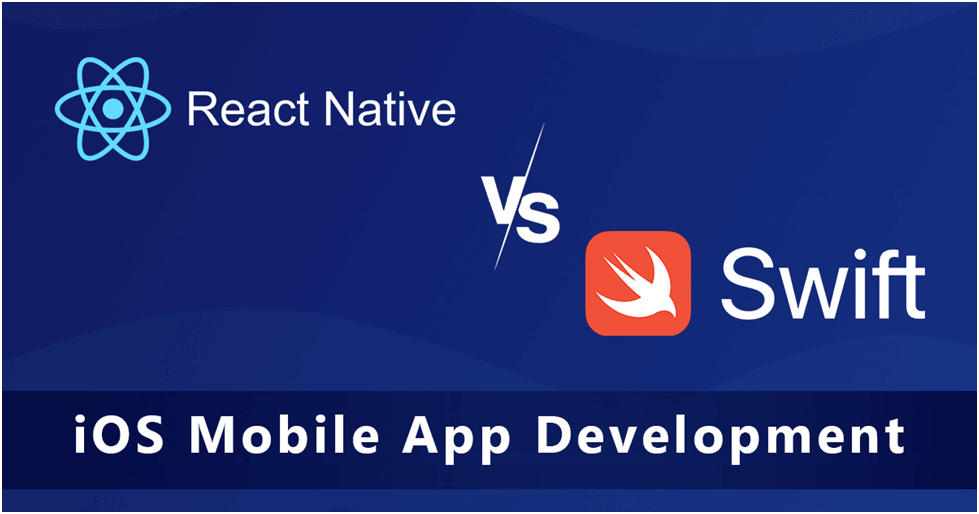React Native vs. Swift: Which Is Better for iOS App Development?

Introduction:
Mobile applications are getting extremely popular because they are making every one of our lives easier. There is an app for everything from connecting with friends to booking flight tickets and even ordering delicious Margaritas at home. There are two types of mobile applications – Android and iOS. Now, focusing on the bigger picture, why are entrepreneurs showing interest in iOS app development?
Well, comparing the two, Android and iOS, the iOS apps basically perform better. They are fast, easy to use, and much more reliable than the Android apps. Oh! iOS apps have fewer bugs too! On the other hand, the Apple ecosystem allows the users to make compatible apps from the entire ecosystem (iPad, macOS, iPhone, iWatch) rather than only the targeted phones!
Last but not least, the UI and UX of Apple are sleek and flawless!
Here’s a statistic about mobile apps you may find interesting:
“Android apps capture 73% of the app market share whereas iOS only secures 26% of the market.”
This means that the iOS app development trend is going to increase. In the meantime, let’s take a look at the difference between React Native and Swift. Swift is a programming language used to create native iOS applications, and React Native is related to the JavaScript framework and is usually used to build platform-independent mobile applications.
Well, this distinction isn’t enough, that is why let’s take an in-depth look between the two market players of app development.
Also Read: 9 Benefits of Using Swift for iOS Development
React Native vs. Swift
Let us compare the two robust and futuristic technologies.
Swift for iOS App Development
What is Swift? Well, it is a programming language compiled and made by Apple specifically to develop native iOS applications. Swift has been in the market for only 7 years now but has already gained massive popularity amongst the iOS app developers. The developers who previously used Objective-C to develop iOS mobile applications briskly shifted to Swift. The community of those with Swift’s knowledge know this language for its flexibility, simplicity, and conciseness.
Well, the primary purpose of developing Swift into the market was to attract more developers and boost the development of applications for iOS and macOS. Comparing the difficulty level of Objective-C with Swift, the new iOS programming language, Swift’s part is much simpler. This language enables the developers to use native hardware features and also build high-quality features for the application.
Why is Swift the most adored programming language for iOS app development?
“Do you know how to work with Swift?” is the most commonly asked question when an app development company looks to hire iPhone app developers. It is because this language is:
1. High Speed
According to Apple’s official website, Swift is 2.6 times faster than Objective-C. The main reason behind this high speed is that it has simple syntax, plus the LLVM tool is used to compile the code. With this programming language, your development process is only going to accelerate.
2. Its readability
It is a more accessible language with simple syntax making it a well-grasping and readable technology. Also, the developers need only a few lines of code to build a functional application.
3. It is safe
Swift comes with type-safe features making the app development process less error-prone. Thus, developers can point out the potential errors while typing the code, preventing the mistakes following the code execution. Swift protects the code from crashing!
Other benefits of using Swift include ABI (Application Binary Interface) stability, a lighter user experience, and its compatibility with Xcode.
React Native for Hybrid App Development
What is React Native? It is the JavaScript framework built by the Facebook team in order to accelerate the process of mobile app development. It is supported by JavaScript, the most popular language in the entire world. Comparing the preferences and app developer support, JavaScript still has the upper hand in the industry with considerable usage.
It is used to build cost-effective cross-platform programs and is a big time saver. In other words, you can penetrate the iOS app development market sooner with this technology.
Well, that was all you needed to get introduced to the iOS app development technology. So, let’s jump to the benefits of React Native. Whenever you think about react native app development for startups, remember the following benefits:
1. It is time-efficient
React Native is an independent operating system that works to reduce the development cycle. Thus, the time to market drastically reduces. A single line of code can be deployed on both platforms.
2. Requires a small team
One JavaScript team is enough to build one program for iOS and Android platforms. Therefore, it saves you from hiring two independent native app development teams. Timeline discrepancies usually occur reduced because you have only one team to coordinate with.
3. High automation
iOS app development with React Native has become much more straightforward. Usually, the development process doesn’t end with just coding it but moves until the apps are tested, released, and fixed of any bugs. With React Native, mundane tasks can be easily delegated to App Center, Amplify, or other third-party services.
To mention other benefits of React Native, its rich library is one thing that the community loves.
Which One to Choose? Swift or React Native?
Now that you know the plus and minuses of both technologies, the big question is when React Native and Swift should be used for iOS app development?
Taking instances from real life, Swift is preferred by businesses who want to build great user interfaces and high memory management. Swift is also a suitable choice for native iOS app development that will be extended to other Apple products like tablets, TVs, or smart wearables.
One should choose React Native for iOS development when you are supposed to develop an MVP or prototype and Swift while developing the native application. It is because React Native is simple and fast. Also, it can be deployed on iOS and Android, which gives you a better option to work with when under a lot of time constraints. Moreover, it is an affordable solution.
Ah! One point to remember is – that simple React Native iPhone apps can be made with React Native if it doesn’t use the device’s features such as Bluetooth or a Camera.
In Conclusion:
There are many factors that play a crucial role in the decision-making of Swift vs. React Native. Application type, duration of the project, preference, and even budget is to be considered when making the selection. If you already have a JavaScript team, then building an independent team would need a lot of justification. However, if you’re looking for iOS app development for a futuristic, feature-rich, and dynamic app with complex graphics, give Swift a heads up without thinking twice!






